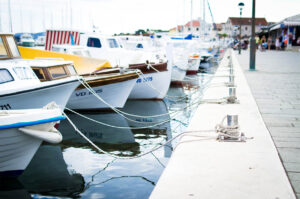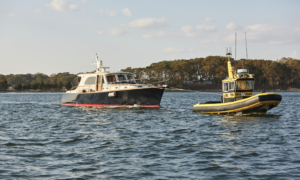For some, being a smart boater and maintaining a boat is a chore that interferes with the enjoyment of boating, but for others the upkeep is actually the joyful part of boating. Regardless of which category you fall into, the simple things often give us grief. It’s fairly easy to keep up with big items like oil changes and bottom paint, but little items such as replacing zinc anodes can create trouble for us when we least expect it.
For instance, Marty noticed the engine temperature on his express cruiser was running hotter than usual but dismissed it to the warm summer temperatures of the Chesapeake Bay water. What he hadn’t noticed was the level in his coolant overflow bottles was also higher than usual, until they started overflowing.
The culprit causing both was a leak in his heat exchanger allowing sea water into his coolant system. When he finally connected the two issues and had it repaired, he wasn’t sure which was worse, the price of the repair bill or partial loss of an all too short summer boating season. As much as both of these hurt, what probably stung the most was his mechanic telling him all of it could have been avoided had he just replaced a $5 zinc anode a little more frequently.
Some form of corrosion by electrolysis takes place on every boat with metal parts in saltwater. When different types of metal are submerged in saltwater, they become a battery with electrical current flowing from one metal to the other. The electrical current is in the form of metal ions being given up by the weaker of the two metals. If this takes place without interruption, eventually the weaker metal will suffer significant damage and possibly corrode away completely.
The way to interrupt the process is by adding an even weaker sacrificial metal into the mix. This is the job of the anodes located in numerous places around your boat. They protect external running gear and internal engine components. Dissimilar metal parts submerged in saltwater are subject to the electrochemical forces at work.
Sacrificial anodes are typically referred to as “zincs,” because they are the most communally used but could just as easily be aluminum, magnesium or an alloy of these metals. Zinc is most frequently used in saltwater, aluminum works in salt or fresh water, and magnesium is used exclusively in fresh water. When selecting an anode supplier, make certain you buy U.S. Military Specification A-18001K for zinc anodes, (Mil-A-24779SH) for aluminum and (Mil-A-21412) for magnesium. Inferior anodes can contain impurities that make them less effective.
The frequency with which you replace sacrificial anodes varies from boat to boat. Inspect them often until you determine the corrosion rate for your individual applications. Their rate of wear will almost certainly vary, with not all anodes corroding at the same rate on the same boat.
When anodes corrode below 50% of their original size, replace them. To extend the life and reduce the frequency of replacement, you can use additional anodes or increase the weight of the anodes. Some zinc anodes, when exposed to fresh or even brackish water, can develop a coating or scale-over, rendering them electrically inert. They look like they’re still good but are no longer working.

Anodes, regardless of material composition, size or application, must make not only physical contact but good electrical contact with adjoining metals. Thoroughly clean or mildly abrade the mating surfaces to ensure good continuity.
When installing pencil zincs in engine heat exchangers do not use sealant tape to seal threads, because this electrically isolates the zinc, rendering it useless. Removing old pencil zincs can be a challenge, due to corrosion around the threads and softness of the brass insert plug. You can apply anti-seize paste that is electrically conductive to the threads on the plug before to threading it into place, making them easier to remove when it’s time to replace them.
If your boat is connected to shore power, be certain your anodes are not protecting all the other boats on the pier. How is that possible, you may ask? The green ground wire in your shore power cord effectively connects your boat’s bonding system to every other boat that’s plugged into the same power supply.
If adjoining boats have poorly protected systems, your anodes may sacrifice themselves to protect their components. The only way to prevent this, is to be a smart boater and short of disconnecting your shore power cord, is to install a galvanic isolator or isolation transformer. These devices will protect your boat from poorly maintained neighbors.
Like many items on your boat, a little bit of smart boater maintenance goes a long way toward trouble-free cruising, along with educing expensive and possibly needless repair bills. A $5 anode replacement beats a $5,000 repair any day.





